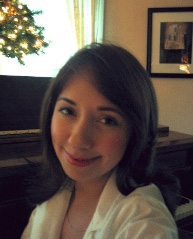Spotlight On…Dr Melinda Tyler
 I truly love being an MD/PhD student because I can honestly say that there is never a slow day at work! After arriving at the teaching hospital, my day might involve, for example, assisting in the delivery of a newborn baby, suturing a patient who has just undergone life-saving surgery, attending to a fatally-wounded patient in the ER, examining under the microscope a slice of brain tissue for cancer cells, or simply soothing a child's stomach ache. If life is going to get really exciting that week, I might also present a case study to my colleagues during Grand Rounds, or fly off to a conference to discuss a research finding with an auditorium filled with international scientists! Furthermore, my course of study, although incredibly challenging, has not made life so tough that I have had to forfeit a healthy personal life. Whatever goes on during the day at work, the excitement continues at home in the evening as I attempt to convince my infant son to have a bath and to go to sleep!
I truly love being an MD/PhD student because I can honestly say that there is never a slow day at work! After arriving at the teaching hospital, my day might involve, for example, assisting in the delivery of a newborn baby, suturing a patient who has just undergone life-saving surgery, attending to a fatally-wounded patient in the ER, examining under the microscope a slice of brain tissue for cancer cells, or simply soothing a child's stomach ache. If life is going to get really exciting that week, I might also present a case study to my colleagues during Grand Rounds, or fly off to a conference to discuss a research finding with an auditorium filled with international scientists! Furthermore, my course of study, although incredibly challenging, has not made life so tough that I have had to forfeit a healthy personal life. Whatever goes on during the day at work, the excitement continues at home in the evening as I attempt to convince my infant son to have a bath and to go to sleep!
Currently, in the healthcare workforce, there exists a pressing need for medical scholars who are well trained in the conduct of scientific research. Opportunities for physician-scientists to see patients and teach, as well as conduct research, are available not only in medical schools but also in government, privately-supported foundations, and in industry. The most direct route to these careers is through the obtainment of both an MD and a PhD. To this end, many universities have established ‘Medical Scientist Training Programs' that specifically educate future physicians in the conduct of scientifically rigorous research, whether it is basic science research or clinical research. At my institution, The State University of New York's Upstate Medical University, MD/PhD students spend approximately 7 or 8 years completing their dual degree program.
Friends of mine have asked me why I would want to spend so many years of my life in higher education, and then been surprised when I have described my quality of life to them. Concomitant with a sky-high level of daily excitement in my work are other tangible benefits: opportunities for travel around the world to attend scientific conferences, hands-on work with cutting-edge technical developments in medicine, involvement in community projects to improve patients' quality of life outside of the clinics, the carrying out of research projects intended to advance the general health and scientific knowledge of humankind, and…being financially supported to do all of this! While other medical students in the US graduate with an average debt of around a hundred thousand dollars, my university fees are waived, and I am provided with an annual stipend equivalent to that of a regular graduate student.
Fifteen years after graduating from Withington Girls' School, my higher education has been completed across four different universities in three different countries, and I have ended up thousands of miles from my alma mater. If a persistent drive to experience as much of what life has to offer as possible has thus far pushed my education, it is a drive that was acquired during my time at WGS. I can still remember my old school, everything about it! I remember enjoying the grandeur of Founders' Day, the beauty of the school auditorium where morning assemblies were held, singing Beatles' songs in our music classes. I remember grumbling over long hours of study, rainy afternoons reading Shakespeare and Homer, or deciphering mechanics equations and struggling with physics experiments.
Looking back now, I realize that I loved those formative years of my life! The lessons that my strong and brilliant classmates and teachers taught me have remained with me over the years, and they remind me that hard work and perseverance will realize for us most of our dreams in life.
Next year, I move to California. I hope to complete my education in Stanford University's Neuropathology residency program. While researching how to cure brain diseases such as Parkinson's disease or Alzheimer's disease, diseases that currently devastate the lives of millions of elderly humans every year, I hope to start learning how to speak Spanish fluently and how to catch a good wave while surfing!
Melinda Tyler, January 2007
Return to Spotlight On page

